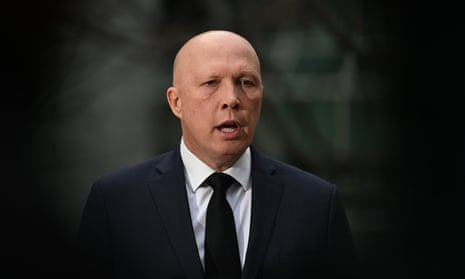Peter Dutton has declared Labor’s proposal to overhaul the energy grid to boost the share of renewable generation “is never going to be realised” and says Tim Flannery ought to apologise for past statements about the link between global heating and extreme weather.
During an appearance on Andrew Bolt’s program on Sky News on Thursday night, the opposition leader characterised Labor’s Rewiring the Nation program as a “pipe dream”.
Dutton’s response followed Bolt declaring the “new religion” of global warming had prompted the Albanese government to adopt “frankly unbelievable and dangerous targets like making us buy electric cars, half of all new car sales by 2030 … [and] making 83% of our electricity come from unreliable renewable energy”.
Bolt also raised a comment made in 2007 by Flannery, then the climate change commissioner, about global heating resulting in less rainfall over the long term before declaring “Sydney has today recorded the most annual rainfall ever, its wettest year ever”.
The broadcaster asked Dutton what he concluded from this. The opposition leader responded: “Well, that Tim Flannery was dead wrong, so I presume he’ll come out and apologise for the mistake, but I wouldn’t hold your breath for that, Andrew.”
What Flannery said in 2007 was, and remains, consistent with what climate science says about global heating leading to more extreme weather, like floods, droughts and bushfires.
Dutton told Bolt rather than talking about transforming the infrastructure of Australia’s power grid to ensure more power can be generated reliably from low-emissions sources, Australia needed to consider nuclear energy.
“I mean, we’ve started this debate on nuclear power in our country,” Dutton told Bolt.
“It’s absurd that in the year 2022 we can’t be talking about safe new technology in the form of the small modular reactors, and France, Canada, China, the United States, the United Kingdom, Germany and many other countries have either adopted or are considering the adoption of nuclear power to firm up the renewables in the system.
“We’re talking in Europe at the moment about a catastrophic winter where people are going to either feed themselves or turn on their heaters, but they’re not going to be able to afford to do both.
“So, power prices will continue to go through the roof in our country whilst Labor pursues their zealot-like approach.”
A range of studies are clear that nuclear energy is one of the most expensive forms of power generation and renewables the cheapest.
Earlier this year, the CSIRO found wind and solar generation are “the cheapest source of electricity generation and storage in Australia, even when considering additional integration costs arising due to the variable output of renewables, such as energy storage and transmission”.
The CSIRO examined the viability of small modular nuclear reactors through a consultation process with Australia’s electricity sector and concluded there was no prospect “of domestic projects this decade, given the technology’s commercial immaturity and high cost”.
after newsletter promotion
The CSIRO noted future cost reductions were possible in time, but that depended “on its successful commercial deployment overseas”.
Dutton was part of a government that signed the Paris agreement, which commits developed and developing countries to limit their emissions to relatively safe levels of 2C with an aspiration of 1.5C, with regular reviews to ensure these commitments can be increased in line with scientific advice.
Climate science suggests Australia cannot afford to wait for a decade to see whether small modular reactors are economically feasible and can be deployed at scale.
According to the latest assessment by the Intergovernmental Panel on Climate Change greenhouse gas emissions must peak by 2025 and can be nearly halved this decade, which would give the world a chance of limiting future heating to 1.5C above pre-industrial levels.
On the Bolt program on Thursday night, Dutton said he was “happy to see renewables in the system, but it needs to be firmed up and if you don’t like coal and gas and you don’t believe hydrogen’s coming any time soon and hydro is not going to fit the bill, what are you left with?”
In 2021, the International Energy Agency said if the world was to stay within safe limits of global heating and meet the goal of net zero emissions by 2050, there must be no new oil and gas development and no new coal-fired power stations built.
The Liberal party has lost the electorates of Warringah, North Sydney, Mackellar, Goldstein, Kooyong and Curtin over the past two federal election cycles in part because voters are concerned about the Coalition’s failure to act on climate change.
Despite this wipe-out in the party’s metropolitan heartland, Dutton resolved after he took the opposition leadership that he would oppose Labor’s 2030 emissions reduction target of 43%.
